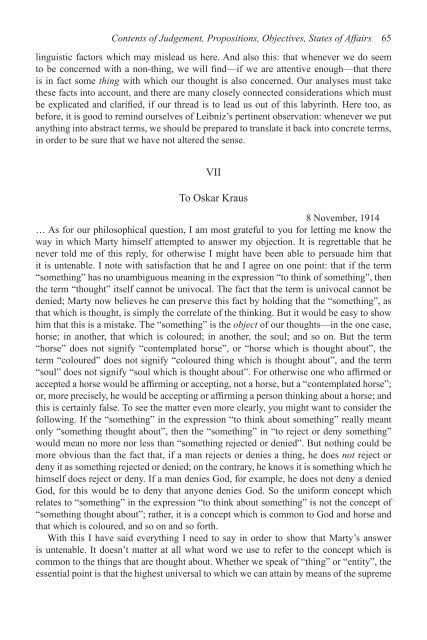Franz Brentano_The True and the Evident.pdf
Franz Brentano_The True and the Evident.pdf
Franz Brentano_The True and the Evident.pdf
You also want an ePaper? Increase the reach of your titles
YUMPU automatically turns print PDFs into web optimized ePapers that Google loves.
Contents of Judgement, Propositions, Objectives, States of Affairs 65<br />
linguistic factors which may mislead us here. And also this: that whenever we do seem<br />
to be concerned with a non-thing, we will find—if we are attentive enough—that <strong>the</strong>re<br />
is in fact some thing with which our thought is also concerned. Our analyses must take<br />
<strong>the</strong>se facts into account, <strong>and</strong> <strong>the</strong>re are many closely connected considerations which must<br />
be explicated <strong>and</strong> clarified, if our thread is to lead us out of this labyrinth. Here too, as<br />
before, it is good to remind ourselves of Leibniz’s pertinent observation: whenever we put<br />
anything into abstract terms, we should be prepared to translate it back into concrete terms,<br />
in order to be sure that we have not altered <strong>the</strong> sense.<br />
VII<br />
To Oskar Kraus<br />
8 November, 1914<br />
… As for our philosophical question, I am most grateful to you for letting me know <strong>the</strong><br />
way in which Marty himself attempted to answer my objection. It is regrettable that he<br />
never told me of this reply, for o<strong>the</strong>rwise I might have been able to persuade him that<br />
it is untenable. I note with satisfaction that he <strong>and</strong> I agree on one point: that if <strong>the</strong> term<br />
“something” has no unambiguous meaning in <strong>the</strong> expression “to think of something”, <strong>the</strong>n<br />
<strong>the</strong> term “thought” itself cannot be univocal. <strong>The</strong> fact that <strong>the</strong> term is univocal cannot be<br />
denied; Marty now believes he can preserve this fact by holding that <strong>the</strong> “something”, as<br />
that which is thought, is simply <strong>the</strong> correlate of <strong>the</strong> thinking. But it would be easy to show<br />
him that this is a mistake. <strong>The</strong> “something” is <strong>the</strong> object of our thoughts—in <strong>the</strong> one case,<br />
horse; in ano<strong>the</strong>r, that which is coloured; in ano<strong>the</strong>r, <strong>the</strong> soul; <strong>and</strong> so on. But <strong>the</strong> term<br />
“horse” does not signify “contemplated horse”, or “horse which is thought about”, <strong>the</strong><br />
term “coloured” does not signify “coloured thing which is thought about”, <strong>and</strong> <strong>the</strong> term<br />
“soul” does not signify “soul which is thought about”. For o<strong>the</strong>rwise one who affirmed or<br />
accepted a horse would be affirming or accepting, not a horse, but a “contemplated horse”;<br />
or, more precisely, he would be accepting or affirming a person thinking about a horse; <strong>and</strong><br />
this is certainly false. To see <strong>the</strong> matter even more clearly, you might want to consider <strong>the</strong><br />
following. If <strong>the</strong> “something” in <strong>the</strong> expression “to think about something” really meant<br />
only “something thought about”, <strong>the</strong>n <strong>the</strong> “something” in “to reject or deny something”<br />
would mean no more nor less than “something rejected or denied”. But nothing could be<br />
more obvious than <strong>the</strong> fact that, if a man rejects or denies a thing, he does not reject or<br />
deny it as something rejected or denied; on <strong>the</strong> contrary, he knows it is something which he<br />
himself does reject or deny. If a man denies God, for example, he does not deny a denied<br />
God, for this would be to deny that anyone denies God. So <strong>the</strong> uniform concept which<br />
relates to “something” in <strong>the</strong> expression “to think about something” is not <strong>the</strong> concept of<br />
“something thought about”; ra<strong>the</strong>r, it is a concept which is common to God <strong>and</strong> horse <strong>and</strong><br />
that which is coloured, <strong>and</strong> so on <strong>and</strong> so forth.<br />
With this I have said everything I need to say in order to show that Marty’s answer<br />
is untenable. It doesn’t matter at all what word we use to refer to <strong>the</strong> concept which is<br />
common to <strong>the</strong> things that are thought about. Whe<strong>the</strong>r we speak of “thing” or “entity”, <strong>the</strong><br />
essential point is that <strong>the</strong> highest universal to which we can attain by means of <strong>the</strong> supreme
















